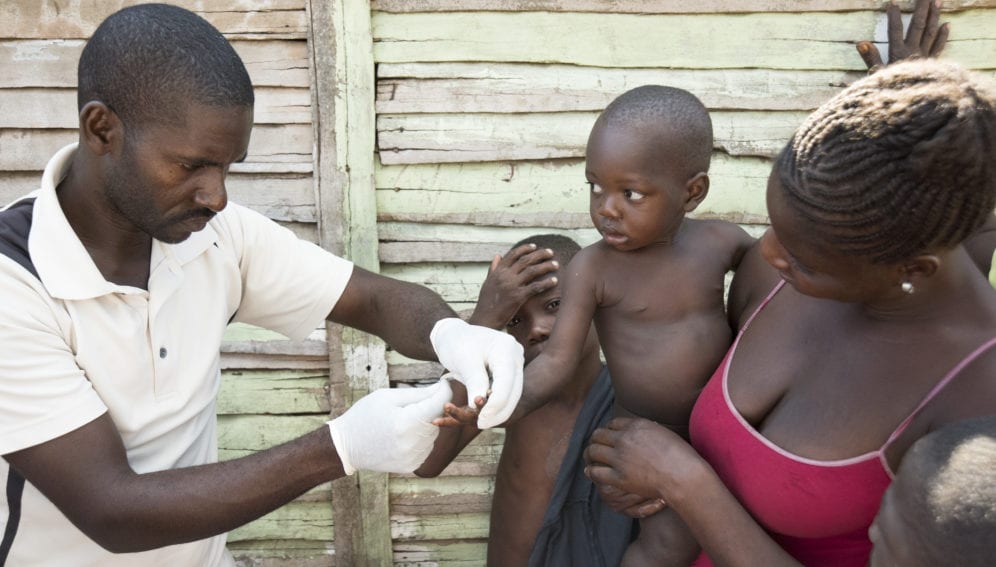21/08/19
Advanced malaria vaccine could offer more protection

Send to a friend
The details you provide on this page will not be used to send unsolicited email, and will not be sold to a 3rd party. See privacy policy.
[NAIROBI] The malaria vaccine RTS,S could provide increased protection against the malaria parasite Plasmodium falciparum because it can produce antibodies against the parasite’s antigens, or protein figments, lacking in the vaccine, a study shows.
In research carried out by the Barcelona Institute for Global Health (ISGlobal), children who received the vaccine showed significantly higher antibodies to the vaccine antigen than those who were not given the vaccine.
The increased antibody responses to specific P. falciparum antigens in subjects immunised with this vaccine may contribute to overall protective immunity against malaria, according to the study.
“We confirmed that those who had the vaccine had significantly higher antibodies to the vaccine antigen than those who did not.”
Carlota Dobaño, Barcelona Institute for Global Health
The World Health Organization (WHO) welcomed the introduction of RTS,S in Ghana, Kenya and Malawi earlier this year, in children up to two years old. But the vaccine’s prevention of almost 40 per cent of cases of malaria in clinical trials is low when compared with vaccines against other diseases including pneumonia, experts say.
A WHO report on malaria published last year showed that 92 per cent of the world’s 219 million cases of the disease in 2017 were in Africa. At present, there is no fully efficacious vaccine against malaria — one of the deadliest diseases worldwide.
Carlota Dobaño, the study’s lead author and a researcher at ISGlobal believes it is essential to continue investigating why the current vaccine candidates are not optimal and find new avenues to improve their efficacy.
In the study published in BMC Medicine last week (14 August), researchers say that their aim was to assess whether the RTS, S vaccine could offer more protection by producing protein figments called antigens against P. falciparum’s, which are not included in the vaccine.
“We confirmed that those who had the vaccine had significantly higher antibodies to the vaccine antigen than those who did not have the vaccine, and we report the novel data that they also had increased antibodies to a set of antigens from the parasite that were not included in the vaccine,” says Dobaño. “This approach … could be applicable to other vaccine candidates in the clinical pipeline.”
The researchers analysed serum samples from 195 children, vaccinated or not, who were part of the phase III RTS,S clinical trial. These were repeated during the following 12 months. Out of these, 78 were from Kintampo, Ghana, a country known for high malaria transmission while 115 were from Manhiça, Mozambique, where transmission is low to moderate.
The study is significant because a more efficacious vaccine together with the currently available measures would be a key tool for the control and elimination of malaria, particularly in Sub-Saharan Africa, explains Dobaño.
“Increased antibody responses to specific P. falciparum antigens in subjects immunised with this partially efficacious vaccine upon natural infection may contribute to overall protective immunity against malaria,” the study says.
Samuel Akech, a principal investigator at the health services unit of KEMRI-Wellcome Trust Research Programme, Kenya, says that the finding raises hope that the RTS,S vaccine may offer broader protection than previously thought.The WHO-recommended tools to fight malaria in Africa include long-lasting insecticidal nets and indoor residual spraying with insecticides.
“Any new vaccines including those developed by exploiting knowledge generated from this study, would need to [be] employed together with existing package of tools and not as a single ‘magic’ bullet,” Akech tells SciDev.Net.
Ombeva O. Malande, a vaccinologist and a lecturer at Uganda’s Makerere University, says the study’s outcome requires larger-scale observations in countries piloting RTS,S to help strengthen the case for the vaccine, and spur the development of even better vaccines.
Young children and pregnant mothers carry the biggest burden of malaria infections and deaths, especially in high burden countries in Sub-Saharan Africa. And with a resurgence of malaria in East Africa, mostly in Uganda and Burundi, the vaccine is timely and highly recommended, Malande tells SciDev.Net.
The outcomes of the RTS,S rollout in pilot countries are to be shared with other countries once they become available.
This piece was produced by SciDev.Net’s Sub-Saharan Africa English desk.
References
Carlota Dobaño and others RTS,S/AS01E immunization increases antibody responses to vaccine-unrelated Plasmodium falciparum antigens associated with protection against clinical malaria in African children: a case-control study (BMC Medicine, 14 August 2019)

